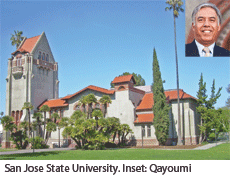Located in the heart of high-tech silicon valley, San José State University is a combination of early 19th century red-tiled Spanish Revival-style architecture and modern, shiny research, teaching and library buildings. It is also at the centre of one of the biggest debates in US higher education, thanks to an experiment that is combining conventional and online learning. As administrators and politicians push to provide online courses that they say will take the pressure off underfunded and oversubscribed conventional ones, some academics — including philosophy scholars at San José State — are pushing back.
In some disciplines, the professors say in an open letter, online courses are turning faculty members into glorified teaching assistants. In the California state senate, a Bill has been introduced that would open the door for students who cannot get into entry-level courses to sit the same subjects provided by online players (including for-profit companies) approved by a committee of academics.
Years of budget cuts in California and other states have clogged the pipeline to and through these “gateway” courses, costing students time and money. But the Bill alarms some academics, who fear the massive economies of scale made possible by online education could imperil their control of the curriculum, not to mention their jobs.
 They also say the controversy misses a significantly more important point: public higher education is being starved of money. “This has been a gigantic distraction,” says Bob Samuels, president of the University Council-American Federation of Teachers, a union that represents some academic staff working in the University of California system. After five years during which funding for public universities in the state has been slashed by about $1 billion (Rs.5,779 crore), Samuels says the sector is now being told to solve its problems with a “magical techno-bullet”.
They also say the controversy misses a significantly more important point: public higher education is being starved of money. “This has been a gigantic distraction,” says Bob Samuels, president of the University Council-American Federation of Teachers, a union that represents some academic staff working in the University of California system. After five years during which funding for public universities in the state has been slashed by about $1 billion (Rs.5,779 crore), Samuels says the sector is now being told to solve its problems with a “magical techno-bullet”.
However, despite such arguments, the momentum seems to be with forms of web-based provision, particularly massive open online courses. “Faculty have been resistant to change for some time,” says Gabi Zolla, vice president for programmes, research and policy at the Council for Adult and Experiential Learning, a not-for-profit organisation pressing universities to award academic credit for students’ life and work experience. “This isn’t new. It doesn’t mean that early adopters can’t change the tide,” says Zolla.
This includes San Jose State. One of California’s overcrowded public universities, the institution has already been experimenting with combining classroom and online education, and it points to impressive improvements in the proportion of students who pass and advance to the next level. “When we talk about a lot of our face-to-face systems, I don’t think we can call them perfect,” says the university’s president, Mohammad Qayoumi. “We should look at other ways we can improve the engagement… and success rates of students. Online education is not going to solve all our problems. It may not fit everybody or be appropriate in every discipline. But the only way you can know is to try it.”
Not everyone on campus agrees. In its open letter, the San José State philosophy professors object to the idea of having their students use a Mooc version of a course taught at Harvard University. For one thing, the letter says, students at an elite Ivy League university and those at an ethnically diverse urban institution may not respond in the same ways or be interested in the same things. “The thought of the exactly same social justice course being taught in various philosophy departments across the country is downright scary — something out of a dystopian novel,” the professors write.
At Amherst College, a private institution based in Massachusetts, academics rejected a plan to join the edX Mooc platform which is backed by the Massachusetts Institute of Technology and Harvard, on grounds that they had no control over the content of courses produced by other universities.
However, according to Qayoumi, when online education is combined with the conventional kind, the results are better than from either model working on its own. By studying the process, Qayoumi argues, “we can design almost an individualised system that will enhance the success of students”.
Advocates of Moocs don’t seem worried that academic protests will significantly slow the platforms’ breakneck growth. “Certainly there are many great classes. And if you have an opportunity to sit around a table with a great instructor, there’s no better education than that,” says Daphne Koller, co-founder of Coursera, one of the biggest Mooc providers, which is based at Stanford University. “But there are a very large number of classes that could benefit from the introduction of technology.”
Koller, a professor in Stanford’s computer science department, says she is all for academic discretion, but adds: “We have a crisis in California, where students wait 18 months to get into calculus I and other gateway courses. I don’t think you should have an allergic reaction to a course just because it is taught online.”
(Excerpted and adapted from Times Higher Education)